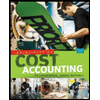Static Budget versus Flexible Budget The production supervisor of the Machining Department for Niland Company agreed to the following monthly static budget for the upcoming year: Niland Company Machining Department Monthly Production Budget Wages $663,000 Utilities 38,000 Depreciation 64,000 Total $765,000 The actual amount spent and the actual units produced in the first three months in the Machining Department were as follows: Amount Spent Units Produced January $721,000 128,000 February 691,000 117,000 March 657,000 105,000 The Machining Department supervisor has been very pleased with this performance because actual expenditures for January–March have been significantly less than the monthly static budget of 765,000. However, the plant manager believes that the budget should not remain fixed for every month but should “flex” or adjust to the volume of work that is produced in the Machining Department. Additional budget information for the Machining Department is as follows: Wages per hour $19 Utility cost per direct labor hour $1.1 Direct labor hours per unit 0.25 Planned monthly unit production 140,000 a. Prepare a flexible budget for the actual units produced for January, February, and March in the Machining Department. Assume depreciation is a fixed cost. If required, use per unit amounts carried out to two decimal places. Niland Company Machining Department Budget For the Three Months Ending March 31 January February March Units of production 128,000 117,000 105,000 $ $ $ Total $ $ $ Supporting calculations: Units of production 128,000 117,000 105,000 Hours per unit x x x Total hours of production Wages per hour x $ x $ x $ Total wages $ $ $ Total hours of production Utility costs per hour x $ x $ x $ Total utilities $ $ $ b. Compare the flexible budget with the actual expenditures for the first three months. January February March Total flexible budget $ $ $ Actual cost Excess of actual cost over budget $ $ $ What does this comparison suggest? The Machining Department has performed better than originally thought. The department is spending more than would be expected.
Master Budget
A master budget can be defined as an estimation of the revenue earned or expenses incurred over a specified period of time in the future and it is generally prepared on a periodic basis which can be either monthly, quarterly, half-yearly, or annually. It helps a business, an organization, or even an individual to manage the money effectively. A budget also helps in monitoring the performance of the people in the organization and helps in better decision-making.
Sales Budget and Selling
A budget is a financial plan designed by an undertaking for a definite period in future which acts as a major contributor towards enhancing the financial success of the business undertaking. The budget generally takes into account both current and future income and expenses.
-
Static Budget versus Flexible Budget
The production supervisor of the Machining Department for Niland Company agreed to the following monthly static budget for the upcoming year:
Niland Company
Machining Department
Monthly Production BudgetWages $663,000 Utilities 38,000 Depreciation 64,000 Total $765,000 The actual amount spent and the actual units produced in the first three months in the Machining Department were as follows:
Amount Spent Units Produced January $721,000 128,000 February 691,000 117,000 March 657,000 105,000 The Machining Department supervisor has been very pleased with this performance because actual expenditures for January–March have been significantly less than the monthly static budget of 765,000. However, the plant manager believes that the budget should not remain fixed for every month but should “flex” or adjust to the volume of work that is produced in the Machining Department. Additional budget information for the Machining Department is as follows:
Wages per hour $19 Utility cost per direct labor hour $1.1 Direct labor hours per unit 0.25 Planned monthly unit production 140,000 a. Prepare a flexible budget for the actual units produced for January, February, and March in the Machining Department. Assume depreciation is a fixed cost. If required, use per unit amounts carried out to two decimal places.
Niland Company Machining Department Budget For the Three Months Ending March 31 January February March Units of production 128,000 117,000 105,000 $ $ $ Total $ $ $ Supporting calculations: Units of production 128,000 117,000 105,000 Hours per unit x x x Total hours of production Wages per hour x $ x $ x $ Total wages $ $ $ Total hours of production Utility costs per hour x $ x $ x $ Total utilities $ $ $ b. Compare the flexible budget with the actual expenditures for the first three months.
January February March Total flexible budget $ $ $ Actual cost Excess of actual cost over budget $ $ $ What does this comparison suggest?
The Machining Department has performed better than originally thought. The department is spending more than would be expected.
Trending now
This is a popular solution!
Step by step
Solved in 3 steps








